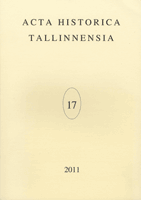BALTISAKSLASTE ÜMBERASUMINE EESTIST 1939. AASTAL
THE RESETTLEMENT OF THE BALTIC GERMANS FROM ESTONIA IN 1939
Author(s): Olev LiivikSubject(s): History
Published by: Teaduste Akadeemia Kirjastus
Keywords: Estonia; Estonian History; RESETTLEMENT OF THE BALTIC GERMANS ; ESTONIA ; 1939
Summary/Abstract: The present article looks at the motives underlying the resettlement of the Baltic Germans (from 1939 to 1940) as described in scholarly writings and memoirs. The interpretations, assessments and arguments of Baltic German authors are studied. The article analyses the motives at the time of resettlement in 1939 and their reflection in later writings. The article is an attempt to find answers to the question whether the motives for the resettlement of the Germans refer to a voluntary or a forced emigration from Estonia to Reich. Two main motives for the resettlement emerge from the writings of Baltic German authors. The two are opposed to each other. The first motive was the fear of communists, substantiated with the horrendous acts committed by the Bolsheviks in Estonia in 1917–1918 and the predicted occupation by the USSR, which threatened Estonia with the signing of the agreement on military bases. The second motive is described as “the call of the Führer” (Ruf des Führers) to resettle to Reich with the mission of carrying out new “special tasks” (Osteinsatz), which according to Nazis’ rhetoric was the official motto of the undertaking. Usually, the last-mentioned motive includes ideological, ethnical as well as cultural arguments. From the remaining motives economic reasons are mainly referred to. The aforementioned motives suggest both voluntary and forced emigration. The fear of communists was brought on by the threat from the USSR in September 1939. When the Estonian Republic maintained its independence following the signing of the mutual assistance pact with the USSR, the threat was no longer as acute. In addition, the Estonian government and media created a hopeful picture of the country’s future, emphasizing the neutrality of the state and security guarantees offered by the USSR, disproving all the rumors claiming the opposite. The optimism of the state leaders may have had an influence on Germans who were going to leave for the fear of communism to change their decisions to relocate or to look for other arguments for the resettlement. Another push factor besides the fear of communism was the fear of losing their status of national minority. This fear was brought on by resettlement propaganda, which forecast the loss of the position of Baltic Germans in Estonia and threatened the Baltic Germans remaining in Estonia to be cast out of the German nation (Gesamtvolk). The future of the Baltic Germans remaining in Estonia seemed bleak: German schools and organizations were closed down, cultural autonomy achieved in 1925 was liquidated, which meant the loss of the status of national minority in the Estonian Republic. Presumably there were some positive expectations balancing out the arguments for leaving the home country. A few decisions to resettle were influenced by the sympathy for the Nazi ideology, sense of national unity and economic perspectives.
Journal: Acta Historica Tallinnensia
- Issue Year: 2011
- Issue No: 17
- Page Range: 037-054
- Page Count: 18
- Language: Estonian

